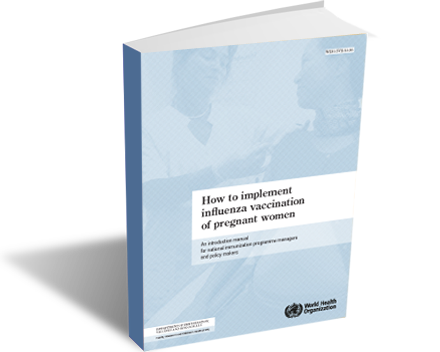Goal
This course aims to help policy-makers, national immunization program managers and immunization partners decide, plan and implement maternal influenza vaccination strategies. It will also assist in foreseeing and addressing potential challenges related to decision-making or implementation.
Considerations for maternal influenza vaccination for policy makers and implementers

Rationale
Professionals involved in the introduction of a new vaccine come from different backgrounds. For maternal immunization, the involvement of additional stakeholders such as antenatal care professionals may be required. Stakeholders need a common understanding of the processes and technical concepts required to ensure smooth implementation of influenza vaccine in pregnant women as their functions in the decision and implementation planning process are interrelated and co-dependent.
WHO influenza recommendations aim to protect vulnerable high-risk groups from severe disease. In 2012, WHO published a position paper on influenza vaccine, which identified pregnant women as the highest priority group for countries considering the initiation or expansion of programmes for seasonal influenza vaccination. In general, maternal vaccination is particularly important to protect both mothers and children up to six months after birth, for whom there is no other preventive treatment option.
The WHO maternal influenza vaccine recommendation, successful experiences with introducing Tetanus Toxoid vaccination for pregnant women, and anticipated future vaccines being considered specifically for pregnant women, highlight the importance and feasibility of establishing a strong maternal immunization platform. Maternal influenza vaccination programs present a key opportunity to establish or augment this platform to protect pregnant women and their infants, who are both at high risk of severe illness from influenza and other diseases of public health importance.
A well-functioning health system provides equitable access to essential medical products, vaccines and technologies of assured quality, safety and efficacy, and acceptability. The introduction of maternal influenza vaccination requires a scientifically sound and cost-effective approach as well as sufficient human resources and training. As expanded service delivery may put additional stress to health systems, decision makers considering the introduction of maternal influenza vaccination need to assess the impact of the vaccine’s introduction on the health system and its components, which act as a set of inter connected parts that have to effectively function together.
Send us feedback
Let us know how we can improve the training course. Click here to send us your comments.
Technical requirements
Acknowledgements
This course is based on implementation manual was written, informed and reviewed by the following individuals.
Contributors
Edwin Asturias, Susan Chu, Supamit Chunsuttiwat, Jessica Fleming, Francois Gasse, Yirgu Gebrehiwot, Gretchen Heinrichs, Terri Hyde, Osman David Mansoor, Jean-Marc Olive, Carla Vizzotti, Susan A. Wang.
From WHO: Dicky Akanmori, Oleg Benes, Maurice Bucagu, James Heffelfinger, Joachim Hombach, Shin Jinho, Pernille Jorgensen, Gunta Lazdane, Philipp Lambach, Assumpta Muriiti, Justin R Ortiz, Alba Maria Ropero-Alvarez, Arun Bhadra Thapa, Özge Tuncalp, Pushpa Ranjan Wijesinghe, Ahmadu Yakubu.
Overall coordination
Philipp Lambach
Reviewers
Eduardo Azziz-Baumgartner, Barbara Jauregui, Nathalie Likhite, Meredith McMorrow, Clint Pecenka, Flor M Munoz, Pierre van Damme, Laura Elizabeth Riley, Stefano Tempia, Margaret Watkins, Gerd Zettlmeissl, and the WHO Immunization Practices Advisory Committee (IPAC).
From WHO: Jhilmil Bahl, Nyambat Batmunkh, Madhava Ram Balakrishnan, Terry Besselaar, Paulus Bloem, Adam L. Cohen, M. Carolina Dan- ovaro, Philippe Duclos, Rudi Eggers, Godwin Enwere, Julia Fitzner, Marta Gacic-Dobo, Tracey Goodman, Carmen Rodriguez Hernandez, Siddhivinayak Hirve, Raymond Hutubessy, Souley- mane Kone, Olivier Lapujade, Patrick Lydon, Carsten Mantel, Claudio Politi, Stephanie Mariat, Melanie Marti, Gill Mayers, Lisa Menning, Liudmila Mosina, Leopold Ouedraogo, Marc Perut, Andreas Reis, Kamel Senouci, Erin Sparrow, Patrick Zuber, Wenqing Zhang, Weigong Zhou.
We would like to acknowledge the contributions of the Centers for Disease Control and Prevention (CDC), which provides financial support to the World Health Organization Initiative for Vaccine Research (U50 CK000431).


